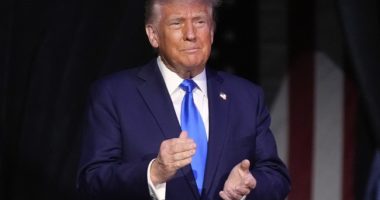The Federal Reserve held interest rates steady for the third consecutive meeting, remaining vague on how soon consumers would get a reprieve from high borrowing costs.
As of the end of December’s two-day policy meeting, which wrapped up on Wednesday, central bankers decided to keep the benchmark federal funds rate between 5.25% and 5.5% — a 22-year high first reached in July.
The highly-anticipated rate decision was accompanied by a statement minimally changed from the previous meeting, noting that the US economy “is sound a resilient.”
The Fed’s remarks also noted a slowdown in economic activity, citing “moderated” US payroll gains — despite employers adding a surprisingly-strong 199,000 jobs last month — as well as low unemployment and easing inflation.
Per November’s Consumer Price Index — which tracks changes in the costs of everyday goods and services — US inflation rose 3.1% in November.
Though it’s a tick lower than October’s 3.2% reading, it nevertheless remains well above the Fed’s 2% inflation target.
Read Related Also: SF School District Agreed to Raises for Teachers, Now They Face a $400 Million Deficit

In the wake of the pause, the Dow Jones Industrial Average and S&P 500 rose less than 1%. The tech-dominant Nasdaq index, experienced an over-2% gain.
The Fed’s move was on par the CME FedWatch Tool, which was projecting a more than 98% chance that rates didn’t advance further in the days leading up to central bankers’ anxiously-awaited decision.
A pause will do little to quell economists and prominent Wall Street executives‘ worries that without a rate cut soon, the economy could be headed for a so-called “hard landing” — where interest rates are taken so high that it spurs a recession.
JPMorgan chief Jamie Dimon sounded the alarm on a possible economic downturn just two weeks ago, warning Wall Street to prepare for the threat of rising interest rates even as inflation slows.

“A lot of things out there are dangerous and inflationary. Be prepared,” Dimon said at the New York Times DealBook Summit in New York.
“Interest rates may go up and that might lead to recession,” he added








